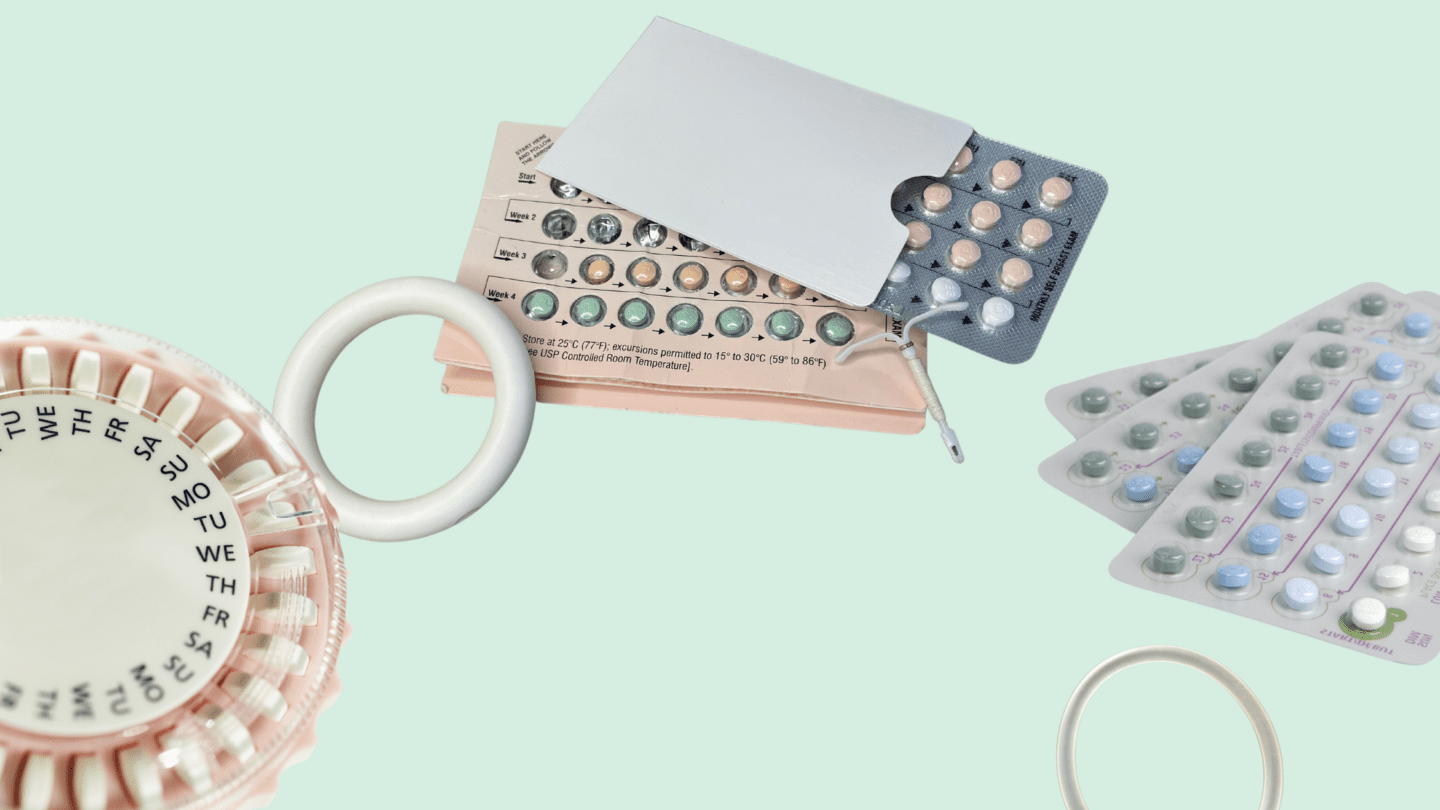Many people are uneasy about the idea of changing the levels in their bodies. Depending on your experience with periods and hormonal birth control, the word “hormonal” might remind you of side effects like mood swings, acne, weight gain, and other not-so-nice things. The thought of adding more hormones to your body with pills can be a non-starter.
But the ways that hormones work in our bodies are complex. When we add sex hormones like the and found in , our bodies adapt by making less of them, keeping levels in check. And adding hormones can sometimes even help. The hormones in can help with things like acne, cramps, , bleeding, and more.1
Studies have also shown that the hormones in don’t have negative long-term effects, meaning it’s typically fine to take for years.2
But everyone’s body is unique and may react differently to different kinds and amounts of hormones. That’s why some people may have a bad experience with a type of that works for their friend.
When it comes to hormonal birth control, it’s less about the fact that you’re adding hormones, and much more about what those hormones are doing in your body.
How do pills work?
Hormonal , whether it’s the pill, patch, ring, shot, implant, or (IUD), releases sex hormones into your body. Some kinds release only , while others release both and .
These two hormones have a number of different functions in the body, but when you take , you’re using them to essentially mimic a pregnancy.3 Your body releases and (the natural form of ) when you’re pregnant, so when the body sees elevated levels of these hormones, it assumes that’s what’s going on.
Progestin says to your body that an egg has already been fertilized, which causes two main things to happen.3 The follicles in your that release eggs won’t develop each month, and your cervical mucus will thicken.3 No ovulation means no pregnancy and, as a backup safety measure, thicker cervical mucus can stop sperm from getting through. helps out also by inhibiting follicles from developing.3
Though all options use the same general kinds of hormones, there are some differences between them that can matter a lot. Different kinds of have different kinds of s in them, and in different amounts.4-6 Some options like the pill release their hormones all at once, while others, like an IUD, release hormones slowly throughout the day.7 All those differences can mean your body might respond differently to one version of the pill compared to another, or to an IUD differently than to the pill.
Why doesn’t result in “too many” hormones
Hormonal recreates what happens to and levels during a pregnancy, with the end goal of preventing ovulation, or the release of an egg.3 So when you take hormonal birth control, you’re basically mimicking the normal hormonal levels that happen naturally during pregnancy. In other words, it’s not more hormones than your body can handle.
When you add hormones from , your body will also naturally decrease the amounts of and it’s making. That means you’re not just stacking more hormones on top of the ones your body is making — it will naturally adapt by making less.
Your levels of and will naturally increase and decrease during your cycle as well. levels out those ups and downs, which can help tamp down things like the mood swings that happen around your period.
Some people might find that they have fewer side effects when they’re taking pills that release lower doses of and . There are a few options for pills with low doses of , as well as the mini pill, which contains just a low dose of .
Are there long-term side effects from pills?
Another common worry is that adding hormones to your body might have detrimental effects in the long term. Mimicking pregnancy long-term might be different than mimicking one for, say, nine months. Thankfully, this question is one that researchers have studied for years, especially related to fertility.
And there’s no evidence that taking over the long term has any ill effects on fertility. A 2018 review looked at 22 studies done between 1985 and 2017 that all looked at people’s fertility after stopping .2 Eighty-three percent of them got pregnant within 12 months, and the researchers concluded that there was no evidence that harmed fertility.
Like what you’re reading? Get the latest straight to your inbox 💌
Another study, from 2009, looked at 60,000 women who were trying to get pregnant after stopping .8 Twenty percent got pregnant within the span of their first menstrual cycle after stopping, and 80 percent were pregnant within a year. Those numbers are similar to people that have never used , the researchers said.
In some cases, it can take a little longer to conceive after stopping — normally no more than a few months.9 That’s especially true for Depo-Provera, also called the shot, which can delay fertility for six months or more.10 But there’s no evidence that is a long-term side effect of .
Hormonal can also affect your odds of getting cancer, both for better and for worse.11 can slightly increase the odds of breast cancer and cervical cancer. It also decreases the risk of ovarian and endometrial cancers. But on average, the prognosis appears to be good: A 2010 review looking at the odds overall concluded that the kinds of cancer increases risk for are outweighed by the kinds it decreases risk for.11
Will make me hormonal?
It’s true that taking can come with side effects. But a lot of these effects are actually positive. And even for those that aren’t, whether you’re taking the right kind of for your unique biology can make a huge difference.
The hormones in can help with mood regulation, bleeding, cramps, and more.1 Estrogen can help treat acne,12 while helps reduce the odds of , reduces bleeding, and may help with and migraines,13 among other things.1
Another common worry about is that it could mess with your emotions.
“I’ve tried multiple different s with all of them giving me bad side effects,” user Renee told adyn. “Most s I have tried cause my mood to change drastically. I feel a lot more short-tempered when I’m using .”
“Being on [Depo-Provera] caused me severe mood swings, depression, anxiety, and I lost about 15 pounds. I felt irritable constantly,” another user, Maggie, told adyn.
Hormonal birth control, and specifically, the wrong kind of for your body, can cause mood swings. Though studies looking at and mood find that overall only rarely has a negative effect on mood, it does happen.14
“Taking the right kind of for your unique biology can make a huge difference.”
And in other cases, can actually help with emotional changes. There’s evidence that the right kind of helps with PMS symptoms by keeping levels consistent over time, and that some types can even help control symptoms of premenstrual dysphoric disorder (PMDD), a more serious cousin to PMS.15
Not all side effects are good, of course. Some types of can lead to heavier bleeding, painful cramps, headaches, nausea, fatigue, and more.16 But weight gain, something a lot of people worry about on , actually isn’t one of them. Studies show no evidence that causes weight gain.17
When thinking about the potential negative side effects of hormonal birth control, remember that not every is created equal. If you’re experiencing side effects that make you want to quit, it’s likely that there’s another kind of out there that would work much better for your body, whether that’s a progestin-only mini pill, IUD, or something else.
Looking for without side effects? Get started by learning more about the adyn’s Birth Control Test.
-
- Schrager, Sarina, et al. “Beyond birth control: noncontraceptive benefits of hormonal methods and their key role in the general medical care of women.” Journal of Women’s Health 29.7 (2020): 937-943.
- Girum, Tadele, and Abebaw Wasie. “Return of fertility after discontinuation of contraception: A systematic review and meta-analysis.” Contraception and Reproductive Medicine 3.1 (2018): 1-9.
- Cooper, Danielle B., Preeti Patel, and Heba Mahdy. “Oral Contraceptive Pills.” StatPearls [Internet] (2022 May 24): Accessed 2022 Oct 31.
- Shahnazi, Mahnaz, et al. “A comparison of second and third generations combined oral contraceptive pills’ effect on mood.” Iranian Red Crescent Medical Journal 16.8 (2014).
- FDA. “Highlights of Prescribing Information: YAZ (drospirenone/ethinyl estradiol) tablets, for oral use.” FDA.gov (2012 Apr).
- FDA. “Highlights of Prescribing Information: ORTHO-CYCLEN® and ORTHO TRI-CYCLEN® (norgestimate/ethinyl estradiol) tablets, for oral use.”FDA.gov (2017 Aug).
- FDA. “Highlights of Prescribing Information: MIRENA (levonorgestrel-releasing intrauterine system).” FDA.gov (2015 Oct).
- Kent, Athol. “Pregnancy Rates After Oral Contraceptive Use.” Reviews in Obstetrics and Gynecology 2.4 (2009): 246.
- Barnhart, Kurt T., and Courtney A. Schreiber. “Return to fertility following discontinuation of oral contraceptives.” Fertility and Sterility 91.3 (2009): 659-663.
- Fotherby, K., and Geraldine Howard. “Return of fertility in women discontinuing injectable contraceptives.” Journal of Obstetrics and Gynaecology 6.sup2 (1986): S110-S115.
- Cibula, D., et al. “Hormonal contraception and risk of cancer.” Human Reproduction Update 16.6 (2010): 631-650.
- Tyler, Kelly H., and Matthew J. Zirwas. “Contraception and the dermatologist.” Journal of the American Academy of Dermatology 68.6 (2013): 1022-1029.
- Warhurst, Samantha, et al. “Effectiveness of the progestin-only pill for migraine treatment in women: A systematic review and meta-analysis.” Cephalalgia 38.4 (2018): 754-764.
- Robakis, Thalia, et al. “Hormonal contraceptives and mood: review of the literature and implications for future research.” Current Psychiatry Reports 21.7 (2019): 1-9.
- Lete, Iñaki, and Oihane Lapuente. “Contraceptive options for women with premenstrual dysphoric disorder: current insights and a narrative review.” Open Access Journal of Contraception 7 (2016): 117.
- Planned Parenthood. “What are the side effects of the birth control pill?” PlannedParenthood.org (N.D.): Accessed 2022 Oct 31.
- Gallo, Maria F., et al. “Combination contraceptives: Effects on weight.” Cochrane Database of Systematic Reviews 1 (2014).









